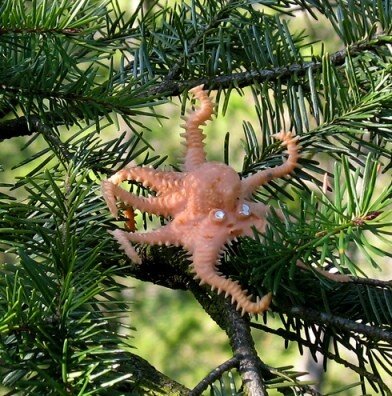
- #Pacific northwest tree octopus how to
- #Pacific northwest tree octopus skin
- #Pacific northwest tree octopus full
The tree octopus’s transformation from harmless spoof into poster child for the hazards of the Web apparently began in 2006, when University of Connecticut research Donald Leu used the site in a study of online literacy among seventh graders. (Then I remembered that my own dog is such a scaredy-cat about outdoor noises that when we go camping he wants to sleep in the car.) But it sounded so nice, especially to a dog owner suffering from occasional guilt about keeping his pooch cooped up inside all day. In reality, that’s all Dog Island was-a spoof website. “Separated from the anxieties of urban life, dogs on Dog Island live a natural, healthy, and happy life,” the Dog Island site claimed. One of my favorite examples-and I have to admit that I fell for it briefly, about five years ago-is Dog Island, an archipelago off the coast of Florida where people supposedly send their dogs to roam free. The thing about hoaxes is that the best ones make you think a little harder about why you believe what you believe. But come on! Without the occasional tree octopus, the Web would be a far poorer place.
#Pacific northwest tree octopus how to
Yes, children must be taught how to sort truth from fiction. Yes, the Internet is a fertile breeding ground for hoaxes and misinformation.

To me, such indignance over the untrustworthiness of the Internet is both amusing and a little sad.
#Pacific northwest tree octopus full
Edutopia, the magazine of the George Lucas Educational Foundation, recently denounced the tree octopus site as full of “pseudoscience” and “outright lies.” And every so often the educational establishment and the mainstream media-most recently, the New York Times-drag up Zapato’s site as an example of the kind of seemingly authoritative material that gives the Web a bad name, by fooling unsuspecting young Internet users into thinking it’s for real. The question is whether children raised on the Web can parse reality properly. The creature is the star of an extensive and hilarious parody website that has, improbably, worked its way into the center of the debate over literacy in the Internet age. Lyle Zapato, a Washington-based author and Web publisher, invented the tree octopus in 1998. But logging and suburbanization have decimated this gentle species’ habitat and reduced the breeding population to critically low numbers, leading some to argue that it should be placed on the Endangered Species List.ĭo I need to add at this point that the Pacific Northwest Tree Octopus is completely fictional? Apparently, I do.
#Pacific northwest tree octopus skin
Every spring the creatures migrate from their lairs in the forest canopy to their ancestral spawning grounds in the Hood Canal the rainy climate keeps their skin moist the rest of the year. If you’re not familiar with the elusive tree octopus, it’s an arboreal cephalopod found in the temperate rainforests of the Olympic National Park west of Seattle. This March marked the 10th anniversary of the campaign to save the Pacific Northwest Tree Octopus from extinction. In this module, you’ll learn about tips and techniques to enable you to find, analyze, integrate, and document sources in your research.In Defense of the Endangered Tree Octopus, and Other Web Myths Wade Roush 8/8/08 Each new source has to be evaluated on its own merit, and this module will offer you a set of tools to help you do just that. There are no hard and fast rules when it comes to resource reliability. The more you research, the more you’ll see that sometimes the least-professional-looking websites offer the most credible information, and the most-professional-looking websites can be full of biased, misleading, or outright wrong information. A good-looking website can be very convincing, regardless of what it says. While this is a relatively harmless example of a joke website, it helps to demonstrate that anyone can say anything they want on the internet. According to an NBC news story by Scott Beaulieu, “In fact, not only did the students believe that the tree octopus was real, they actually refused to believe researchers when they told them the creature was fake.” Department of Education study that used the Tree Octopus website as a focal point revealed that students who encountered this website completely fell for it. Many of us feel that “digital natives”–people who have grown up using the internet–are naturally web-savvy. There is no such creature, unfortunately. The Tree Octopus website is a hoax, although a beautifully done one. If you’re starting to get the feeling that something’s not quite right here, you’re on the right track. You can also watch this brief video for more about the creatures: If you’ve never heard of the Pacific Northwest Tree Octopus, take a few minutes to learn more about it on this website, devoted to saving the endangered species.

The charming but elusive Tree Octopus became the focal point of internet scrutiny. A few years ago a little-known animal species suddenly made headlines.


 0 kommentar(er)
0 kommentar(er)
